It’s Time to Rethink
K-12 Education
The Purpose of Education Index shows parents are
finally ready to change how students learn
It’s Time to Rethink
K-12 Education
The Purpose of Education Index shows parents are
finally ready to change how students learn
In September of 2022, Populace, a Massachusetts-based think tank specializing in private opinion research concerned with what people actually believe, conducted the Purpose of Education Index. The survey aimed to determine what Americans want most and least for the future of education and their perceptions of other people’s priorities.
This first-of-its-kind survey was completed by a nationally representative sample of 1,010 American adults. In addition, Populace collected a sample of 1,087 American parents to allow for a separate examination of parent priorities.
The results make one thing very clear: the majority of Americans believe schools should be focused on rethinking how we educate students moving forward while also believing that society is content with the status quo.
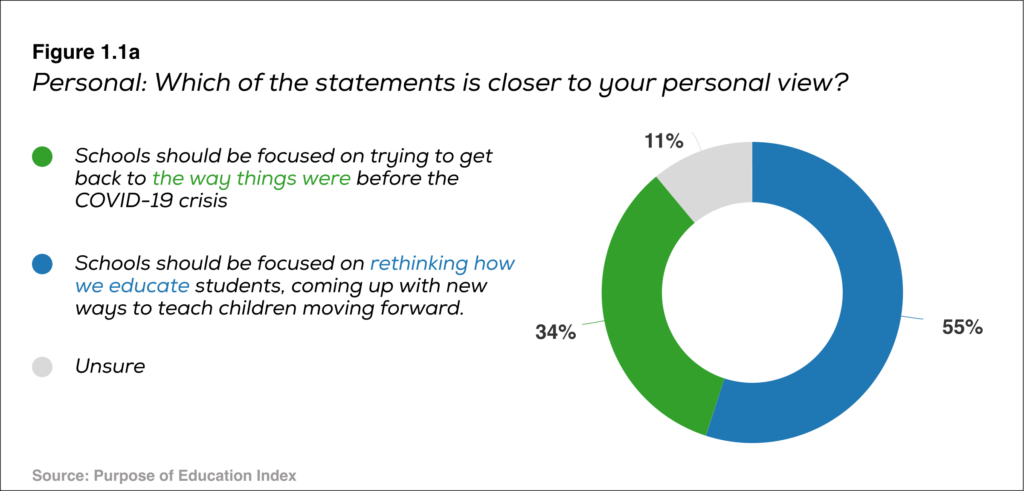
As you can see from the survey results, more than half of Americans personally feel that schools should be rethinking how we educate our students and coming up with new ways to teach children should be a priority moving forward. Only a third want to return to how things were before the COVID crisis.
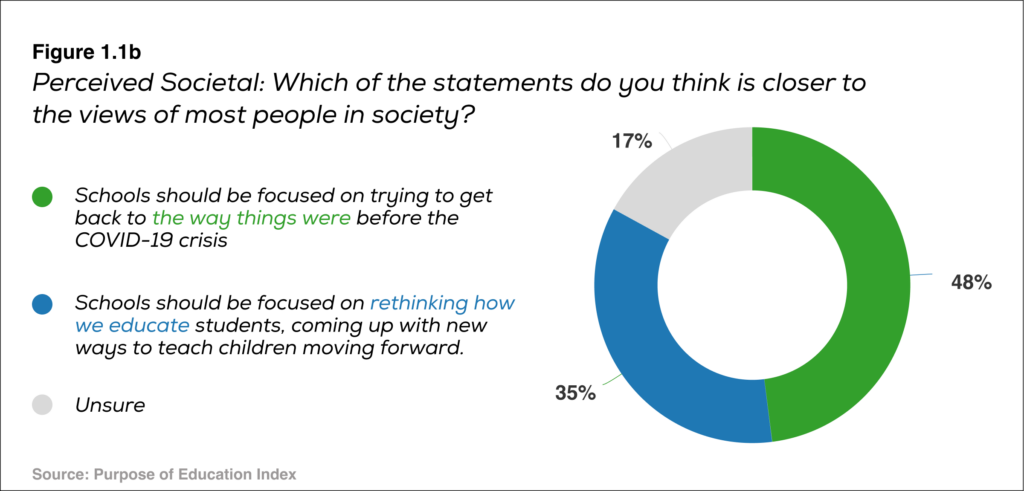
On the other hand, respondents have a very different perception of what society wants from education. The numbers are essentially flipped, with roughly half believing that society wants to return to how things were before COVID and about a third believing society wants to rethink how students learn.
Besides arriving at this broad consensus on the need for change, The Purpose of Education Index identified 57 priorities which it asked its 1,010 participants to rank by personal priority alongside how they believe society prioritizes them.
One thing that stood out in the report is a near consensus from respondents on developing students who can think critically, problem solve, and make decisions is a top priority. In fact, it came in as the second most important priority among survey respondents when weighted across demographics (the development of practical skills like financial literacy came in at #1).
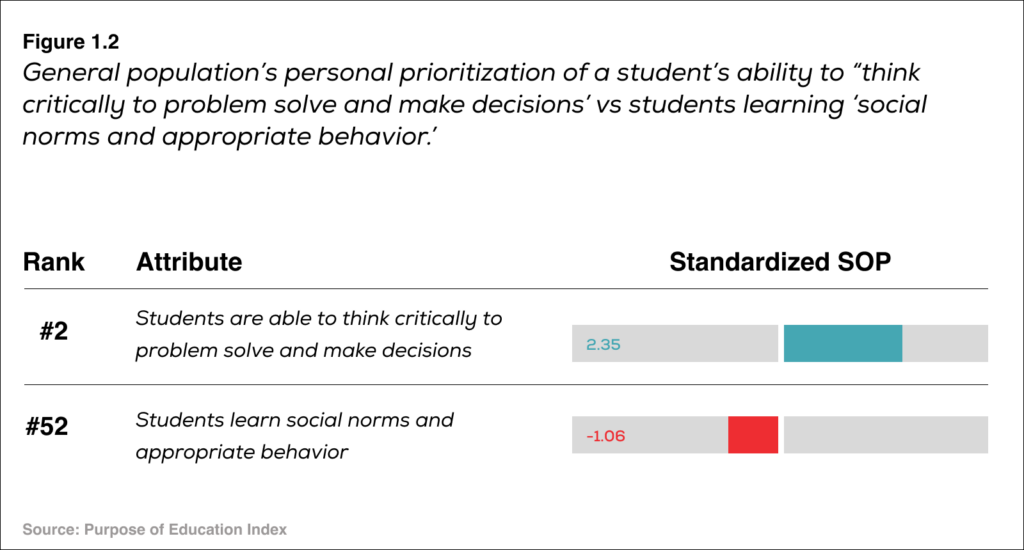
With rapid technological developments and a move towards globalization dramatically altering today’s workplace, it’s little wonder that the ability to think critically, problem-solve, and make decisions has seen such a dramatic ascension in priority for K-12 parents. The report states that problem-solving and good choices are learned skills, and parents want their schools to be a place where skills like this are taught. And with a decline in priority for learning social norms and appropriate behavior, parents have even less of a desire for uniformity.
With an understanding of The Purpose of Education’s methodology in place, let’s jump to its five main takeaways.
Five Main Takeaways from The Purpose of Education Index Report
According to Populace, there are five main takeaways from The Purpose of Education Index report:
- College should no longer be the end goal of K-12 education.
- Practical skills and outcomes should be the end goal.
- Individualized education is the future, one-size-fits-all is the past.
- Education priorities vary immensely by race.
- “Better” is no longer the goal – “Different” is.
As you can see, COVID-19 appears to have had a significant impact on what American’s prioritize in the education system, something Populace CEO Todd Rose confirms in the following quote: “The COVID era fundamentally altered the way most of us view education and what our kids should get out of it. The K-12 educational system is wildly unresponsive to what parents and children actually want. Americans don’t want ‘better’; they want different. They want a way out of the one-size-fits-all approach driven by standardized testing models and elite institutions making us compete in a zero-sum game and instead an educational framework geared towards individualized learning, practical skills, and preparation for a meaningful life.”
Next, let’s look at how THINK Global School aligns with the five above takeaways.
How Does THINK Global School Align with The Purpose of Education Index Takeaways?
At THINK Global School and other progressive educational institutions worldwide, these takeaways have been at the forefront of curriculum overhauls for years and, in some cases, decades. In designing our Changemaker Curriculum, we faced some difficult realities in migrating from a teacher-led classroom to a student-driven environment. The results have been clear, though: our students appreciate the agency and autonomy that personalized learning presents them. Overall engagement is up, as is the feeling of belongingness according to the results of the Hope Survey we issue to students twice annually.
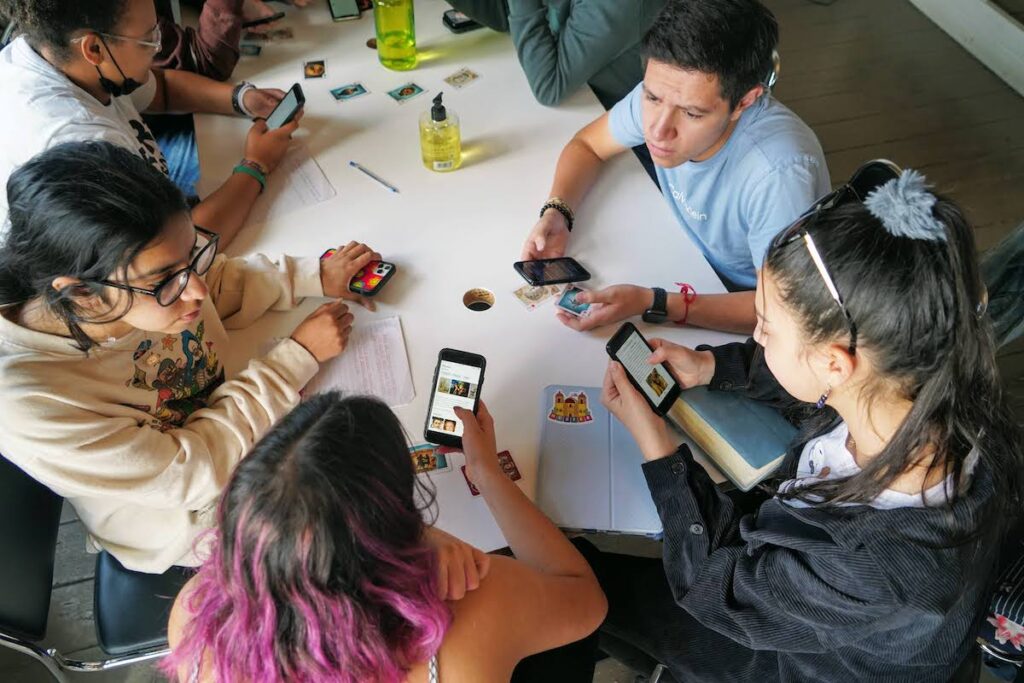
To put it even more simply: When put into practice, the takeaways from the Purpose of Education Index can transform learning for students not just in the United States, but around the world as well — we’re proof of it.
The remainder of this post will highlight the Purpose of Education Index’s main takeaways and how THINK Global School actively approaches them.
#1: College Should No Longer Be the End Goal of K-12 Education
What the Purpose of Education Index says: Conventional wisdom, and decades of social engineering, have told us that the point of K-12 education is to make students college-bound — often to the most prestigious one possible. Before COVID, respondents ranked being prepared to enroll in a college or university as their 10th highest priority for K-12 education. In post-COVID America, this is no longer the case. When given 57 priorities for children’s K-12 education, Americans ranked it as #47. However they believe it is other people’s third-highest priority, demonstrating a deep societal misunderstanding of one another.
Despite the overwhelming agreement that society prioritizes a K-12 education system that prepares students to enroll in a college or university (perceived rank #3), the current study found that the American public personally deprioritizes college preparation. When considering all 57 trade-off priorities for what people personally want from the education system, college preparation ranks in the near bottom, at 47th. Put another way, Americans think that preparing students to enroll in college is a high priority for most other people, but in private they actively deprioritize it.
How we approach this: While the vast majority of THINK Global School graduates attend university (94% as of 2023), we realize that increasingly in fields like computer science, where companies like Google hire based on skills rather than degrees, the return on investment might not be worth it for some students.
At THINK Global School, we place a heavy focus on teaching the skills of today and tomorrow through our project-based learning modules and other collaborative activities. Each module incorporates the 21st century skills necessary for success in the real world. These include visual literacy, global awareness, teaming and collaboration, critical thinking, and effective communication, among others.
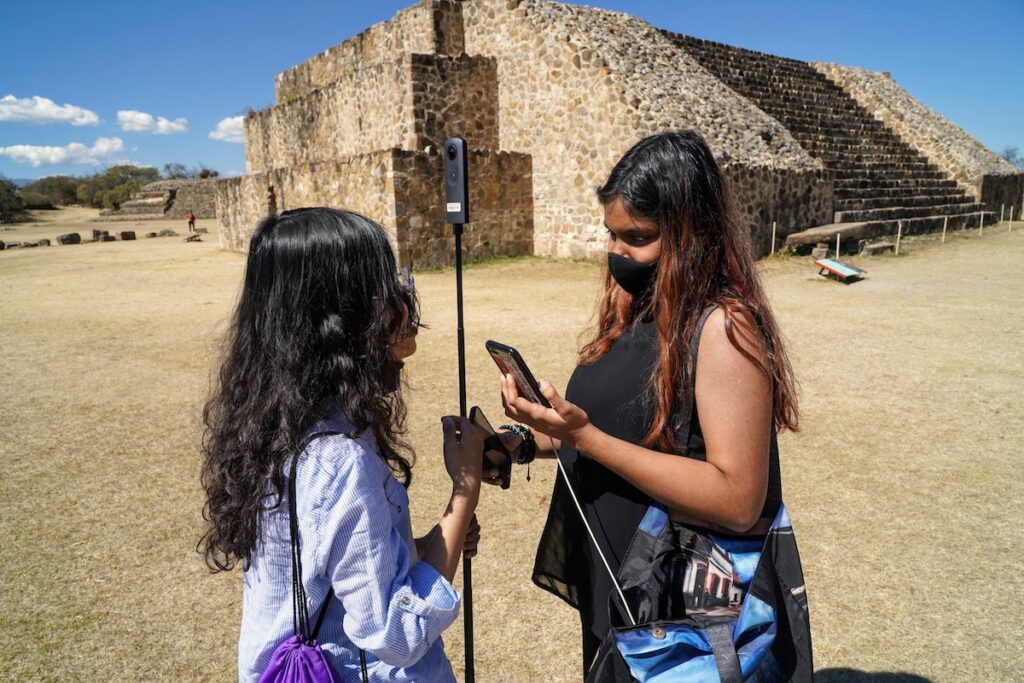
We also use various forms of technology regularly to build up digital literacy skills in our students, preparing them for success in a world that is rapidly changing in terms of how we live, work, and communicate. In Oaxaca, Mexico, for example, our students participated in the VRArchaeology module, which combined modern tech (virtual reality equipment) with a time-honored discipline, archaeology, to answer the question: How can I preserve a part of Zapotec history and give it new life in the form of VR experiences?
By helping students develop the skills necessary to succeed in our technology-driven world, we’re able to increase their competitiveness and potential for career advancement, whether that includes university or not.
#2: Practical Skills & Outcomes Should Be the End Goal
What the Purpose of Education Index says: Americans want K-12 education to be focused on practical, tangible skills and outcomes. Respondents reported students develop practical skills (e.g. manage personal finances, prepare a meal, make an appointment) as the #1 priority for education outcomes. Demonstrates basic reading, writing, and arithmetic (#4), prepared for a career (#6), effectively plan, and prioritize to achieve a goal (#11), and have the skills to be competitive in the local job market (#12) vastly outperformed less practical or short term goals such as prepared for a paid internship or entry level job (#40), students learn social norms and appropriate behavior (#52), and students develop athletic talents (#56). And while respondents do not want schools instructing students on social norms (#52), they firmly believe that a student demonstrating character (e.g. honesty, kindness, integrity, and ethics) should be a vital marker of a school’s success (#3).
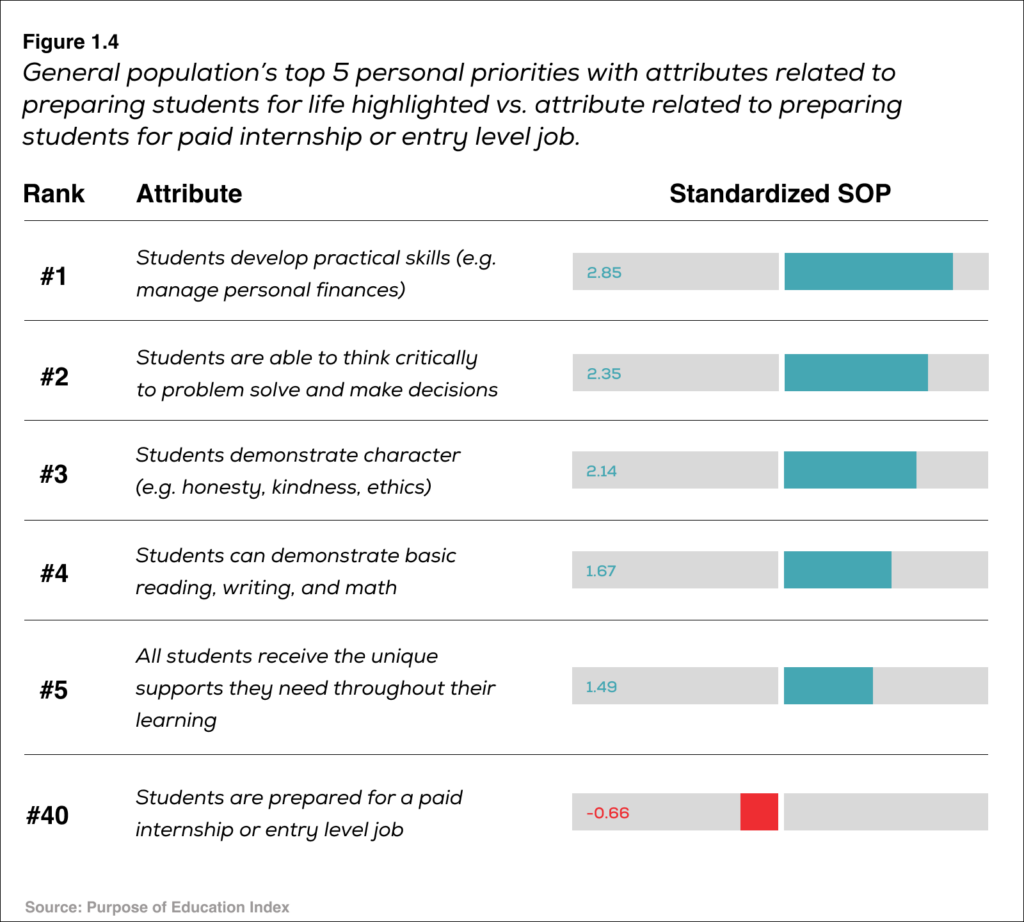
How we approach this: Alongside teaching our students 21st century skills, we also teach them equally valuable life skills during their time at THINK Global School. Due to our unique traveling nature, students have relative freedom to explore four different locations each year and learn experientially through these firsthand experiences: investigating new and unfamiliar environments and cultures develops adaptability; navigating the unexpected events that spring up teaches the ability to problem-solve; everyday interactions with restaurant owners, local experts, and classmates teach interpersonal skills; and personal budgets, both for meals and projects, teach financial literacy.
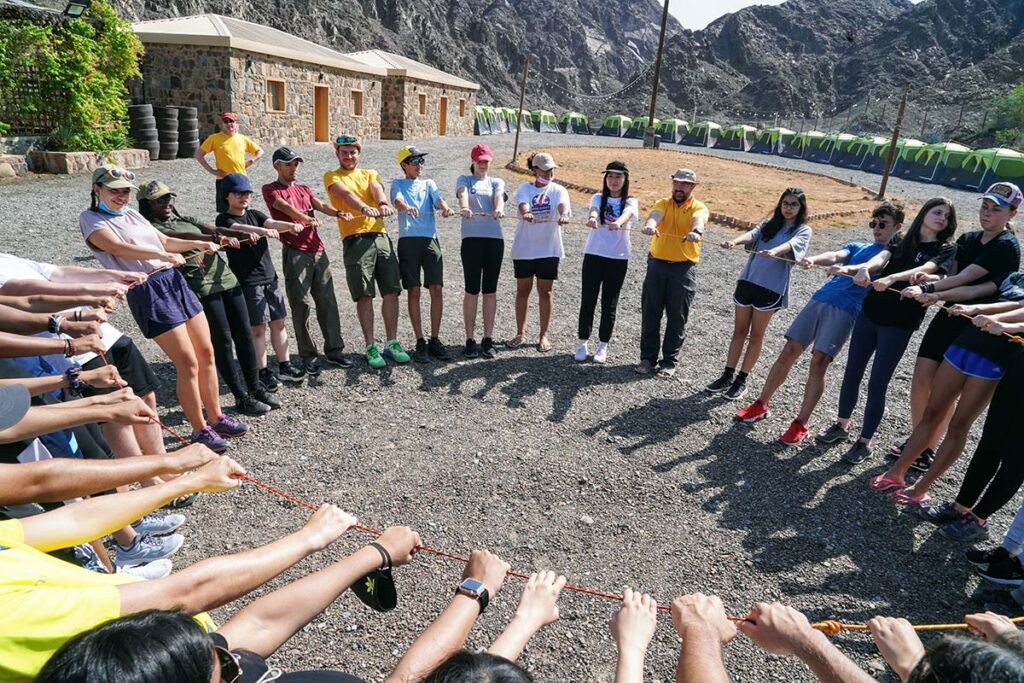
Our holistic approach to education also heavily emphasizes integrating THINK Global School’s eight core values into our community’s daily lives. Drawn from all across the world, our core values provide a common purpose for students to pursue, teach respect for one another, and foster a culture of accountability. So whether it be practicing empathy, exercising grit, or engaging in ubuntu, THINK Global School’s core values develop the type of character that is highly desirable in civic communities, universities, and the workplace.
#3: Individualized Education Is the Future, One-Size-Fits-All Is the Past
What the Purpose of Education Index says: One-size-fits-all approaches to K-12 education turn off the vast majority of Americans. Respondents believe students should advance once they have demonstrated mastery of a subject (#7) rather than when they pass an arbitrary test. In fact, student success being evaluated based on standardized tests was ranked as a bottom 10 priority (#49). Students having the time they need to learn at their own pace is ranked 13th-highest priority. In the same vein, respondents believe that all students should receive the unique support that they need (#5) rather than all students receiving the same level of support (#34).
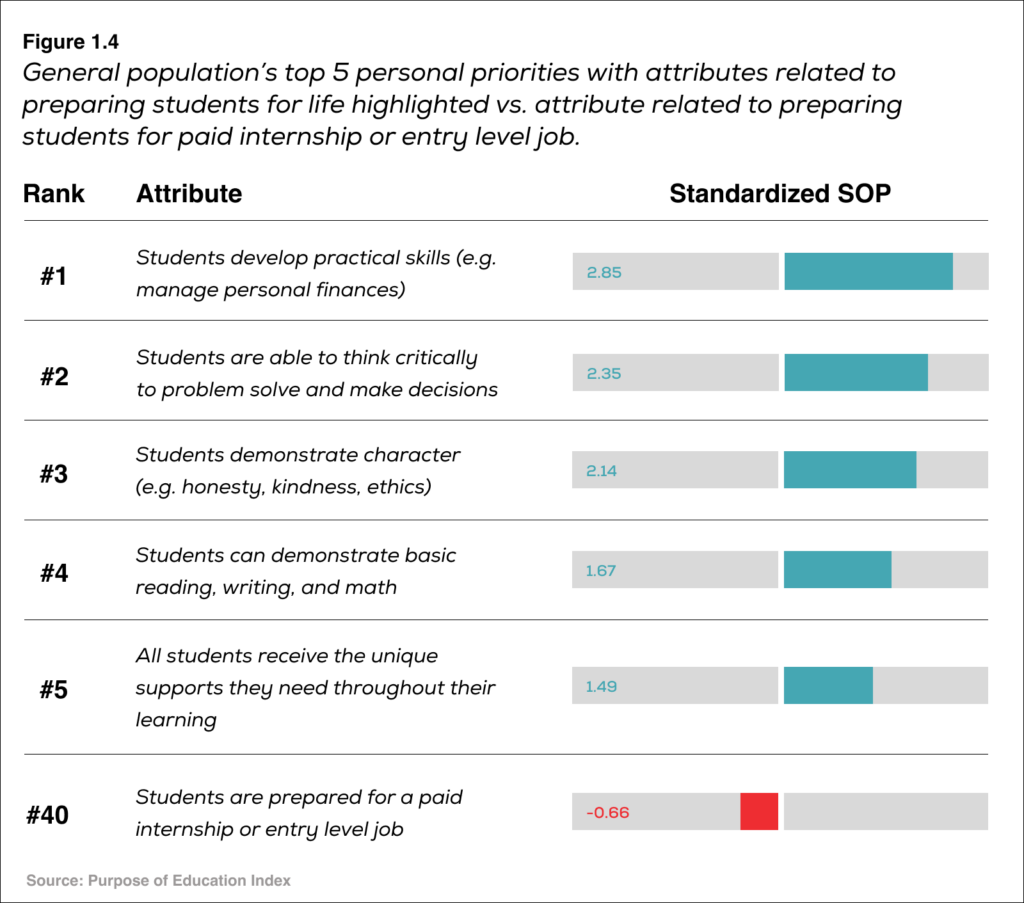
Generally, Americans do not care if all students study the same thing (#54) compared to them getting to choose courses based on their individual interests (#9). Data clearly illustrates that individualized and tailored approaches that recognize students’ unique needs are preferred.
How we approach this: At THINK Global School, we developed the Changemaker Curriculum with our diverse student body in mind. We asked ourselves: how can we provide an individualized education that considers each student’s unique background, needs, abilities, and interests?
One powerful approach we use is project-based learning (PBL), which allows students to collaborate with peers while also receiving personalized attention. In a PBL environment, students have the freedom to explore topics and solve real-world problems that are relevant to their lives.
At TGS, we take this approach even further by centering our projects around the countries we visit. For example, students have explored the Turkish economy through the lens of different communities, planned sustainable urban settlements in Mumbai, and documented Sabah’s ethnic food cultures through writing and photography. Wherever we are in the world, local contexts are at the center of our compass.
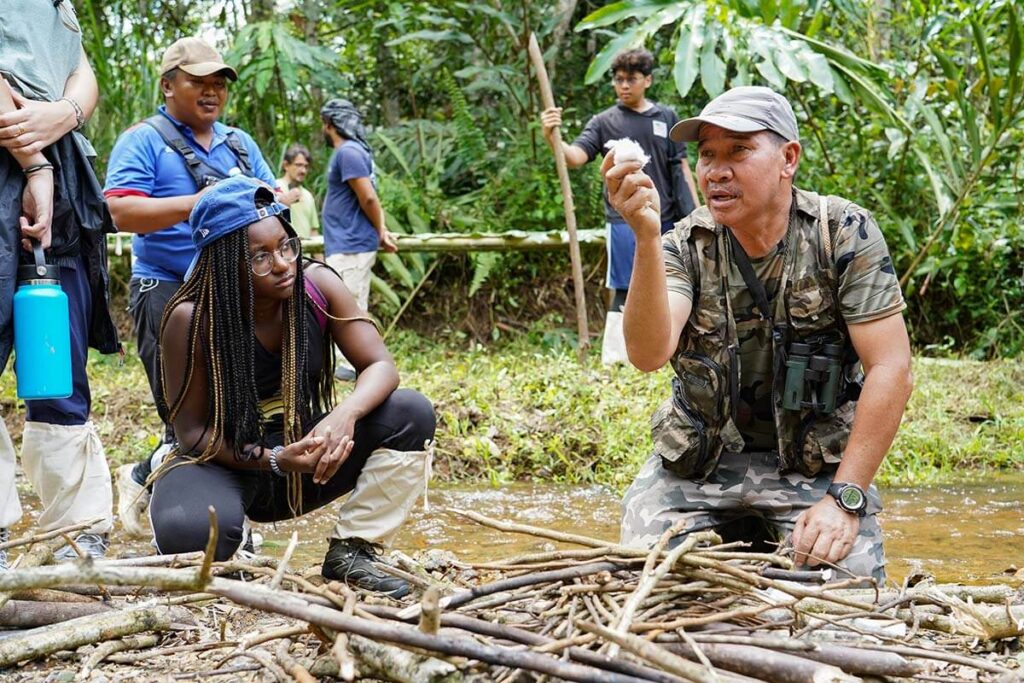
Throughout their time at TGS, students work at their own pace and approach problems as they see fit. They master applicable skills by continually building upon their existing knowledge. And unlike standardized tests, which don’t consider learning styles, difficulties, or needs, projects provide versatility and the chance for students to practice their strengths and realize their weaknesses through failure.
So how do you learn through failure? Fail-fast learning, which we also practice, encourages students to experiment and try new things to arrive at a solution. As industries are shifting, it’s imperative that students can make mistakes, learn from them, iterate, and arrive at conclusions. This process is at the heart of all our projects and provides real-world value to our students regarding their personal and future professional lives.
#4: Education Priorities Vary Immensely By Race
What the Purpose of Education Index says: While developing critical thinking and practical skills were common across racial groups, there are noticeable differences by group, further indicating that the current one-size-fits-all approach to education fails to address the needs and wants of students and parents. Being prepared to be a productive member of society is the fifth-highest priority for Hispanics compared to White (#48), Black (#39), and Asian (#30) respondents.
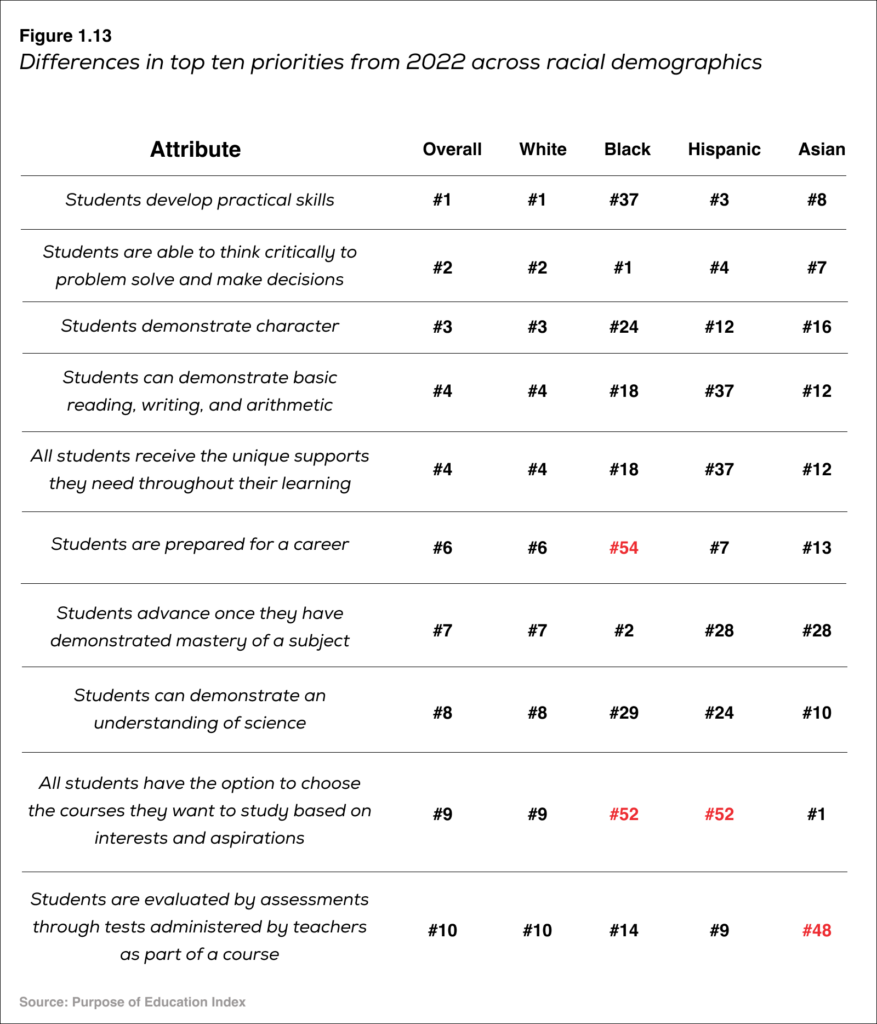
Black respondents were the only group to have a student being able to leverage technology to accomplish complex needs as a top five (#5) priority. The next highest was White respondents at #20. Black respondents ranked students advance with a teacher’s determination of readiness as their third-highest priority compared to White (#55), Hispanic (#35), and Asian (#52) respondents. Similarly, students advance if they meet minimum grade requirements was the #1 priority among Hispanic respondents — the only racial group to prioritize that higher than #38.
Asian respondents are the only racial demographic to have prepared to enroll in a college or university as a top 10 priority (#9) — the only group staying near the pre-COVID priority level. Black (#4) and Asian (#3) respondents had students understand and know how to participate in democracy as a top four priority compared to White (#21) and Hispanic (#29) respondents.
How we approach this: At THINK Global School, we’ve always prided ourselves on our diversity. When we’ve had two cohorts of sixty students in recent years, they’ve typically come from around thirty different countries. This diversity is crucial for promoting cultural understanding and exposing students to a wide range of perspectives not found in homogeneous classrooms where everyone has similar backgrounds and needs.
To address the issue of varying priorities by race, we take a whole-child approach to education that considers each student’s academic, social-emotional, and health and wellness needs. Because our community is heterogeneous and our students have different expectations and requirements, we offer individual advisory sessions to assess their needs and ensure that no one falls behind. We also provide regular opportunities for students to address issues collaboratively with educators and school counselors in advisory groups.
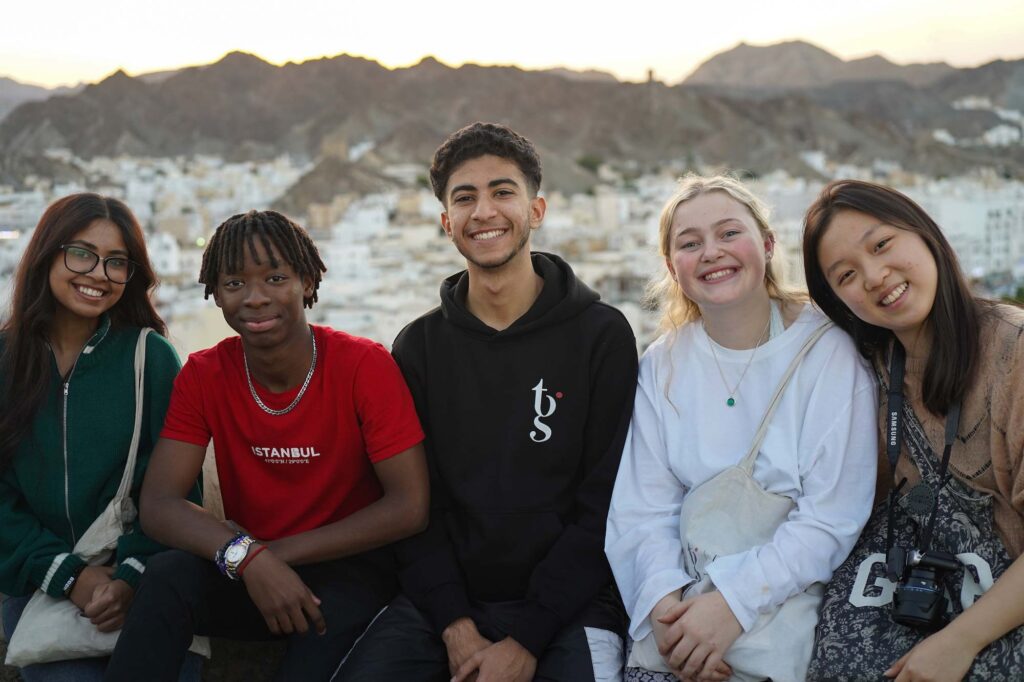
By giving our students the support they need in all areas of their lives, we ensure they have a fulfilling high school experience and leave with the tools they need to succeed whether in university, the workplace, or their interpersonal relationships.
#5: “Better” Is No Longer the Goal — “Different” Is
What the Purpose of Education Index says: One of the most prevalent threads across the data illustrates that Americans are fed up with the current education system, beyond the point of wanting improvements to the existing structure. The vast majority of the general population believes more things about the educational system should change than stay the same (71%), including 21% who say nearly everything should change.
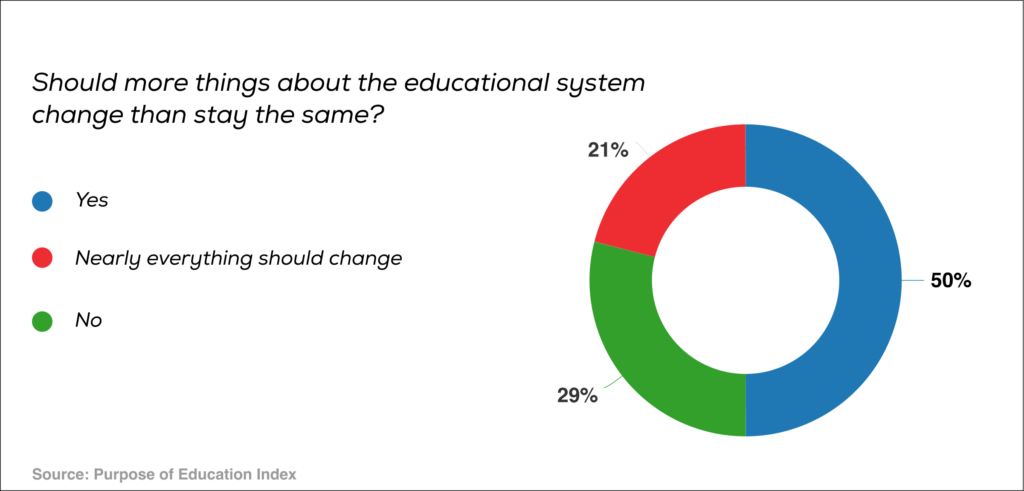
Better is no longer the goal — something entirely different is. Whether it is wanting a greater focus on practical skills, individualized learning experiences, or reorienting the end goals, Americans’ priorities for K-12 education are largely absent from the current system.
How we approach this: It’s encouraging to see so many people in agreement that change is long overdue. The education system is broken, but not irretrievably. THINK Global School was founded on a simple premise: “What if?” and over the years we’ve morphed into a school that can serve as a model for others in our approach to exploring new and effective ways to engage students and prepare them for the challenges of the 21st century. In fact, we did just that last year with the launch in 2022 of our professional development center, THINK Learning Studio.
Here are some of the main ways we are approaching education in a new and impactful manner:
- Curriculum design: For us, having our educators take a step back and let students lead their learning was difficult at first, but it’s paid dividends in terms of engagement and preparation for the real-world. Utilizing makerspaces around the world has also boosted creativity, critical thinking, and problem-solving skills.
- Project-based learning: Inspire students through real-world projects that can be worked on collaboratively and that explore a wide range of driving questions
- Experiential learning: Experiential learning, or place-based learning, is getting out of the classroom and into the world. Any school can leverage their community and learn from their surroundings and local experts
- Implementation of technology in the classroom: THINK Global School is recognized as an Apple Distinguished School for its innovative use of technology, and we’re always exploring new ways of bringing tech into our projects and learning environments.
- Personalized learning: Switching to personalized learning has led to our students taking greater ownership of their learning and a deeper understanding of the subjects they engage in. Learning independently also provides great benefits for university and the workplace.
- Community outreach and service learning: THINK Local, as we call it, provides opportunities for our students to feel more connected to the countries they inhabit and apply their knowledge in a variety of ways. Oftentimes our students will apply their entrepreneurial skills to help local businesses with graphic design, marketing, and other activities that can have a tangible impact. Service learning activities don’t have to be purely physical, but those are great as well.
- Adherence to core values: As mentioned above, our core values play a crucial role in our students’ development by providing purpose, teaching respect, and creating accountability. Several of our graduates still adhere to our core values alongside others they’ve adopted along their personal journey.
- Heterogeneous community: Diversity has many benefits, chief among them the ability to learn different perspectives and ideas, empathy, and the skills needed to thrive in a multicultural workforce.
- A whole-child approach: In the wake of COVID, schools are realizing just how much impact the pandemic had on students’ mental health and regarding learning loss. By practicing a whole-child approach, which equally emphasizes academic, mental, and physical health, schools can recognize that each student is a unique individual and give them the resources that they need for continued success.
Conclusion
In conclusion, the COVID-19 pandemic has caused a significant shift in the way parents view K-12 education. The Purpose of Education Index survey results indicates that parents are finally ready to embrace new models of education that prioritize personalized learning, project-based learning, and skills development. As a result, education providers and policymakers must work together to implement these changes and ensure they are accessible to all students, regardless of socioeconomic status or geographic location. By doing so, we can create a more equitable and effective education system that prepares students for the challenges of the 21st century.
Ready to embark on the educational journey of a lifetime?
A passion for travel. A strong academic record. And the desire to improve the world as you experience it. If this sounds like you, you just might be our ideal candidate! Start your application with a five-minute inquiry form - you never know where you might end up.
It all starts here.
Apply nowReady to embark on the educational journey of a lifetime?
A passion for travel. A strong academic record. And the desire to improve the world as you experience it. If this sounds like you, you just might be our ideal candidate! Start your application with a five-minute inquiry form - you never know where you might end up.
It all starts here.
Apply nowSign up if you would like to receive occasional news from us.
SubscribeGet inspired! Check out our blog for engaging stories, updates, and fresh perspectives from the THINK Global School community.
Explore